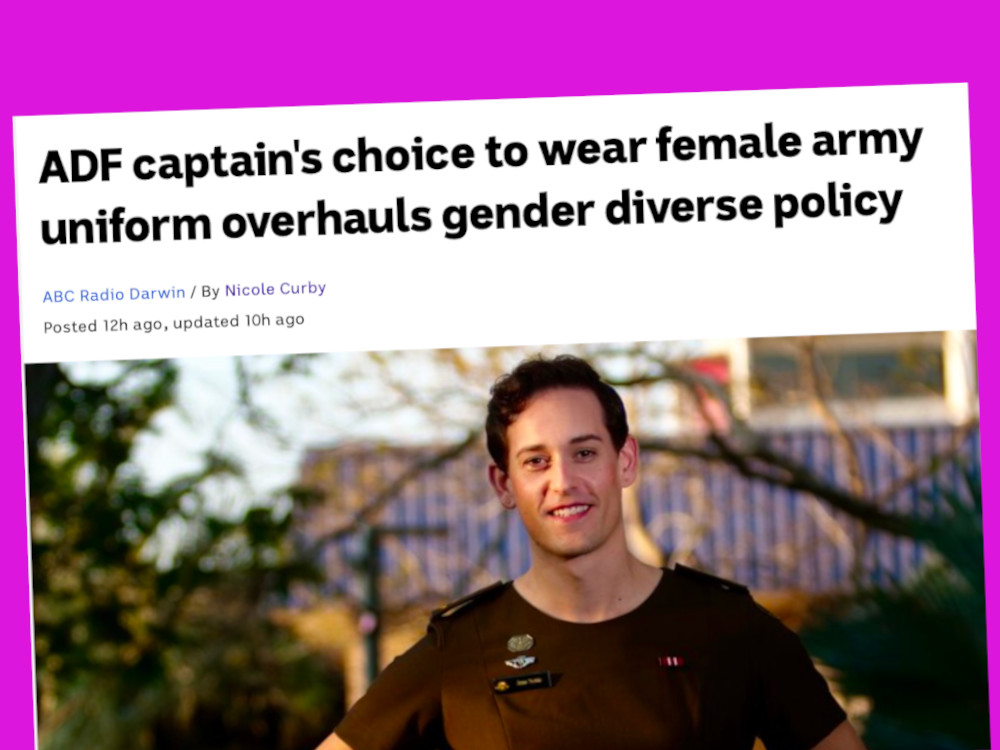You’ll know what I mean when I tell you about it: pick a social issue from mental health to agriculture. the ABC will have tackled the issue by finding an individual case study and telling the story through their voice.
It’s an entirely legitimate form of journalism, essentially a tabloid technique, but it is being overused by the national broadcaster.
Take a topic away from the political process, scan the stories on the ABC website, and you’ll find heaps of them.
It is too late for a spoiler alert. Now that I have sensitised you to the overused trope, you will run the risk of getting as irritated as I have become ever since someone pointed out the maddening overuse of this journalistic formula to me.
But here’s a case study of these case studies – and you will see a flaw in this way of doing journalism.
“ADF captain’s choice to wear female army uniform overhauls gender diverse policy” is a legit story of a gender diverse army officer. The Other Cheek does not object to the ABC giving this story prominence; in a post-Christendom world, it is hard to object to people we might disagree with getting space.
If Christians want to be seen media-wise, then others must also be seen.
Captain Jesse Noble “took their heart in their hands and fronted up to their boss at Darwin’s First Combat Signals Regiment.
“‘I said, “Hey, so I’m going to be putting some paperwork up to you,” they said.
“‘I’m gender diverse. I’m non-binary, and I am going to be opting for the female uniform.'”
Noble’s commanding officer gave immediate permission for them to wear female uniforms.
For Christians, one sentence stands out. “At 35 years old, they had spent their entire life in the Pentecostal Church. They were married with kids and a captain in the Australian Army.”
But we don’t get to hear how the church – which Noble left – responded or even which church it was. They are voiceless.
We get to hear Noble’s account of his wife’s reaction.
“It wasn’t just the army Captain Noble had to confront.
“‘I was in a relationship that I really cared about,'”‘ they said.
“‘The person that I was with loved Jesse, the big masculine but sensitive, strong army kind of guy.’
“The couple had two children together, and their faith shunned homosexuality and gender diversity.
“‘I knew it was going to be really, really challenging,’ they said.
“Captain Noble approached their partner: ‘”‘I don’t really know how to go through this with you, but I love you, and I still want to be with you. Can we go on that journey?'”‘
Later the story reveals “Captain Noble’s marriage ultimately ended in divorce.
“‘And at that point, I was separated from the church,'”‘ they said.”
This story is essentially one-sided, with Captain Noble’s wife, church and children not given any voice -treated as “other.”
This is not balanced journalism. Captain Noble’s wife anf the church might have been approached by ABC’s Nicole Curby, who reported Captain Noble’s story, but we are not told that – and the normal journalistic convention would be to include that information.
A contrast can be drawn with a profile of Liberal Party politician Michael Yabsley by Andrew Hornery in the Sydney Morning Herald. Susie Yabsley is offered a chance to be part of the story, which she declined. I give credit to Hornery, a publically gay man, for having injected into balance into his coverage. Yabsley spoke about the unequal dynamics of his coming out in another Hornery piece. “I feel significantly unburdened by that, but there is also a truckload of guilt about hurting people I care about.”
There is an inherent inequality in the media coverage of this sort of story; one person is the decision maker and the other is the person acted upon. One chooses media coverage, and the other either gets left out, or has to be the voice of someone abandoned. When the relationship endures – on the journey, Noble invited his wife on, there is more likely to be reporting of the “success”.
It would take really good journalism to present all sides of the Captain Noble story. As a media consumer reading a one-sided account, I feel that the story has not been fully told.

